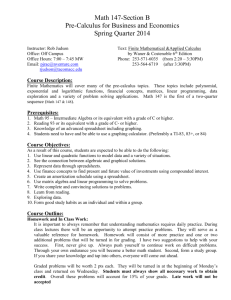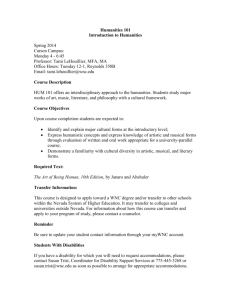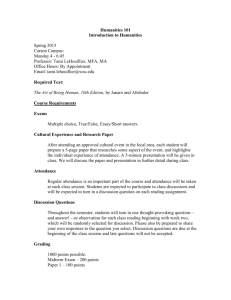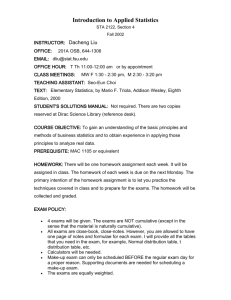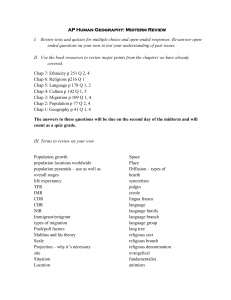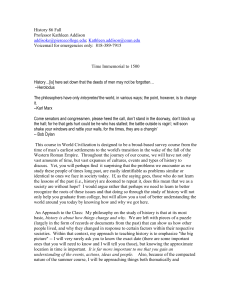I. ASCRC General Education Form Group VI: Historical and Cultural Studies Dept/Program
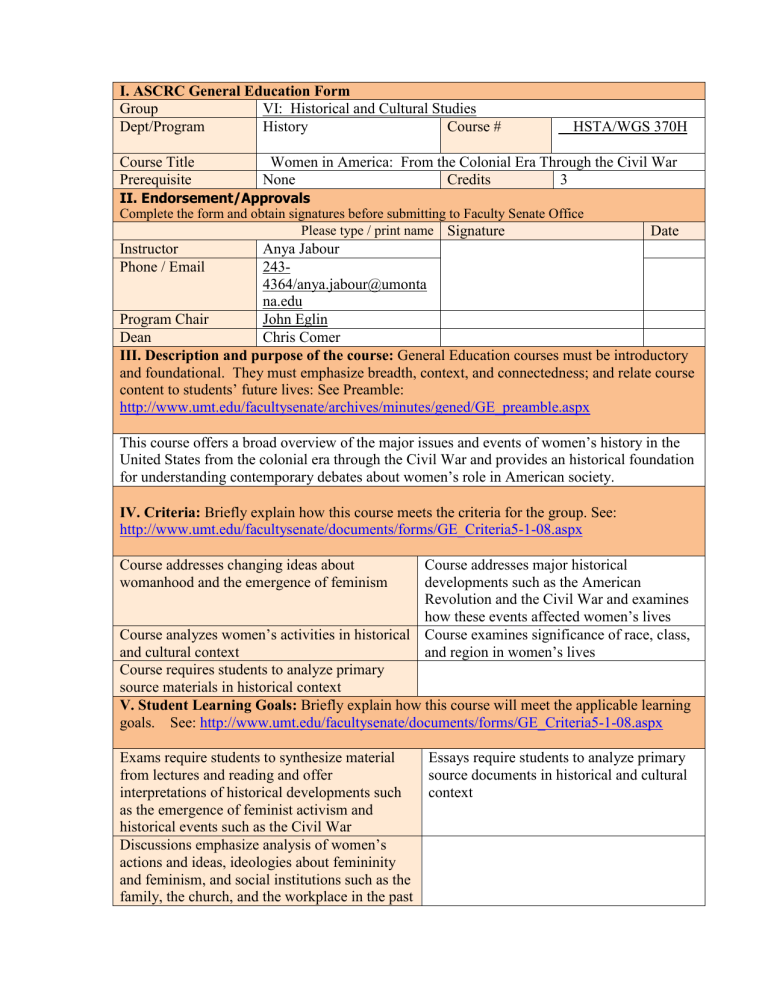
I. ASCRC General Education Form
Group VI: Historical and Cultural Studies
Dept/Program History Course #
Course Title
HSTA/WGS 370H
Women in America: From the Colonial Era Through the Civil War
Prerequisite None
II. Endorsement/Approvals
Credits 3
Complete the form and obtain signatures before submitting to Faculty Senate Office
Please type / print name Signature
Instructor Anya Jabour
Date
Phone / Email
Program Chair
Dean
243-
4364/anya.jabour@umonta na.edu
John Eglin
Chris Comer
III. Description and purpose of the course: General Education courses must be introductory and foundational. They must emphasize breadth, context, and connectedness; and relate course content to students’ future lives: See Preamble: http://www.umt.edu/facultysenate/archives/minutes/gened/GE_preamble.aspx
This course offers a broad overview of the major issues and events of women’s history in the
United States from the colonial era through the Civil War and provides an historical foundation for understanding contemporary debates about women’s role in American society.
IV. Criteria: Briefly explain how this course meets the criteria for the group. See: http://www.umt.edu/facultysenate/documents/forms/GE_Criteria5-1-08.aspx
Course addresses changing ideas about womanhood and the emergence of feminism
Course addresses major historical developments such as the American
Revolution and the Civil War and examines how these events affected women’s lives
Course analyzes women’s activities in historical and cultural context
Course requires students to analyze primary source materials in historical context
Course examines significance of race, class, and region in women’s lives
V. Student Learning Goals: Briefly explain how this course will meet the applicable learning goals. See: http://www.umt.edu/facultysenate/documents/forms/GE_Criteria5-1-08.aspx
Exams require students to synthesize material from lectures and reading and offer interpretations of historical developments such as the emergence of feminist activism and historical events such as the Civil War
Discussions emphasize analysis of women’s actions and ideas, ideologies about femininity and feminism, and social institutions such as the family, the church, and the workplace in the past
Essays require students to analyze primary source documents in historical and cultural context
VII. Syllabus: Paste syllabus below or attach and send digital copy with form.
The syllabus should clearly describe how the above criteria are satisfied. For assistance on syllabus preparation see: http://teaching.berkeley.edu/bgd/syllabus.html
History/WS 370H: Women in America from the Colonial Era through the Civil War
Professor Anya Jabour
LA 254, ext. 4364
E-mail: anya.jabour@umontana.edu
Office Hours: MWF 10 a.m.-11 a.m. in LA 262
Additional times by appointment
Course Description and Goals
This course, the first half of a two-semester sequence on U.S. women’s history, will acquaint students with the major issues and events of women’s history in the United States from the colonial era through the Civil War. Students also will learn to interpret historical materials and to communicate their ideas effectively through speaking and writing.
This course counts toward the “Historical and Cultural” perspective for General Education requirements and fulfills one of the “U.S.” courses required of history majors. It also may be used toward a Women’s Studies emphasis within the Liberal Studies major or toward a minor in Women’s and Gender Studies. If you have questions about either the History Department or the Women’s and Gender Studies Program, please feel free to discuss them with me.
Course Readings
Nancy Woloch, ed., Early American Women: A Documentary History, 1600-1900 (any edition)
Kathryn Kish Sklar and Thomas Dublin, eds., Women and Power in American History (2 nd
ed.)
NB: Both required readings are available for purchase at the UC Bookstore and are on reserve at Mansfield Library. If you have difficulty attaining the readings for any reason, please let me know as soon as possible and I will do my best to accommodate you.
Course Requirements and Grading:
Course requirements are designed to foster and measure achievement of the goals listed above.
This class will follow a lecture-discussion format; on lecture days (generally Mondays and
Wednesdays) information will be presented in class to provide a general overview of the topic for that week, while on discussion days (generally Fridays) we will emphasize active involvement in the learning process through discussion of the assigned readings. To facilitate discussion, practice historical analysis, and improve your writings skills, you are required to write five short (2-page) papers over the course of the semester, each based on the readings for that week. Your comprehension of the course material also will be evaluated on essay-style midterm and final exams. Overall, half of your grade will be based on attendance,
participation, and papers, and half of your grade will be based on performance on the exams, as follows:
Attendance/Participation: 25 percent
Short Essays: 25 percent
Midterm Exam:
Final Exam:
Attendance and Participation:
25 percent
25 percent
Attendance and participation are vital to your success in this class (and will count for 25%of your overall grade). Missing lectures will cause you to fall behind in your understanding of the material, thus leading to poor performance on the exams. Missing discussion days will result in an immediate lowering of your grade. Each student is permitted two “free” absences from discussion days. (Late arrivals and early departures will each count for one-half of an absence.)
Thereafter, each absence will lower your attendance/participation grade by a full letter grade: a third absence will result in an attendance grade of B, a fourth in an attendance grade of C, a fifth in an attendance grade of D, and a sixth in an attendance grade of F. Under extraordinary circumstances, such as a documented personal, family, or medical emergency, you may have one additional “excused” absence. All absences for university-related events (“away” games,
Model UN, etc.) or public service (jury duty, Army Reserves) will be excused with written documentation. Additional work will be required for all excused absences and should be arranged in advance except in emergencies.
Good participation is also very important. Discussion days will revolve around your comments and questions about the reading and other classroom material. This means that the quality of your preparation and your contributions are essential. First of all, of course, this means that you must read the material carefully and think about what you would like to say about it in class (see below). Next, come to class prepared to speak, but be sensitive to others’ comments, too. Listening and posing questions, as well as offering insights, are important discussion skills. Listen to your peers, encourage them to expand on their points, offer supporting comments or alternative viewpoints, and above all, always connect your comments to the reading! Everybody brings a different perspective to the class, but the text is our common ground.
Careful reading is essential to every aspect of this class. In this class, you will read both essays and documents. Essays are secondary sources written by professional historians. As you read the essays in Women and Power in America , pay special attention to (and take notes on) these points:
What is the author’s argument, or thesis?
What evidence does the author present in support of her/his argument?
How does the essay relate to other class material (lecture and documents in EAW ) for that week?
Documents are primary sources written by historical actors. As you read each document in
Early American Women , think about (and take notes on your answers to) these questions:
Who wrote the document?
When was the document produced?
Where was the document made?
What is the document about?
Why is the document interesting or significant?
How does the document support, modify, or contradict relevant material in the secondary sources (essays) and/or in lecture?
Short Essays:
Your short essays serve several important purposes (and will each count for 5% of your overall grade, or 25% altogether). They allow you to “rehearse” for class discussion by writing out your ideas before expressing them verbally in class. They encourage you read carefully and to make connections between the readings. They provide you with a study guide for the midterm and final exams. Finally, they give you the opportunity to improve your historical analysis and your writing skills week by week. While I will grade your response papers primarily for content rather than for form, I will note grammatical and spelling errors and will make suggestions for improving the organization and analysis.
Over the course of the semester, you will complete five short essays based on primary source materials, or documents. Each essay should be two typed, double-spaced pages long. You may earn up to 20 points for each essay, for a total of 100 possible points over the entire semester.
Use the guidelines (or rubric) below:
Describe the document.
Who produced the document and/or what group(s) does it describe?
When was the document produced and/or what time period does it describe? Where did the document originate and/or what place (country, region, state, city) does it describe? (1/2 page;
5 points)
Summarize the document.
What is the document about? What information does it contain?
What class themes/topics does it address? (1/2 page; 5 points)
Analyze the document.
Why is the document interesting or significant? How does it support, contradict, or modify other class material (lectures or essays)? N.B.: Be sure to include at least one specific example and/or quotation in your response to these questions and to indicate the page(s) where they can be found. (1 page; 10 points)
Include a complete citation for your document in the heading or title page of your paper, using the following format:
Susanna Wesley, “Evangelical Child-Rearing,” 1732, in Nancy Woloch, ed., Early American
Women: A Documentary History, 1600-1900 , 2 nd ed. (New York and other cities: McGraw
Hill, 2002), 29-33.
To receive credit, short essays must be submitted in class on the Friday of the week(s) when the selected reading is listed on the syllabus. Except in emergencies or in cases of excused absences for university-related activities or public service, no late essays will be accepted.
Midterm and Final Exams:
Finally, the midterm and final exams (25% each) will measure your understanding of all class material (lectures, readings, and discussion). Both exams will be essay-style, take-home, and open-book. Further details (and review) will be provided in class.
Course Policies
No late assignments will be accepted except in cases of a documented personal, family, or medical emergency. There will be no “make-up” exams. Students do have the option of obtaining and completing exams early. Please arrange this at least a week prior to the scheduled distribution of exams.
Incompletes are intended for use by students who have fulfilled all course requirements
(including attendance) prior to a documented medical, family, or personal emergency that prevents the student from completing the remainder of the course. Incompletes will be granted at my discretion based on theses criteria. Students must arrange incompletes as early as possible.
Students must practice academic honesty. Plagiarism or cheating of any kind will result in a failing grade in the course. More severe penalties, including suspension or expulsion from the
University, may apply under the Student Conduct Code.
Students with physical disabilities are eligible for assistance in the form of sign-language translators or all-access classrooms. Students with learning disabilities are eligible for assistance in the form of note-takers or additional time for exams. If you plan to utilize these options, please register with Disabled Student Services and consult with me as soon as possible to make suitable arrangements.
Grades will be assigned according to the following criteria: A=outstanding; B=good;
C=mediocre; D=inadequate; F=unacceptable. Pluses and minuses will be used on both individual assignments and to compute your overall grade according to the point system below.
According to University policy, all courses taken for General Education credit must be taken for a traditional letter grade; students must earn a C-minus or better to count courses toward either General Education or their major or minor.
93-100 points: A
90-92 points: A-
87-89 points: B+
83-86 points: B
80-82 points: B-
77-79 points: C+
73-76 points: C
70-72 points: C- (lowest passing grade for General Education or degree requirements)
67-69 points: D+
63-66 points: D
60-62 points: D
59 and below: F
Practice common sense and courtesy in the classroom. Be seated and prepared for class prior to the first bell. Do not disrupt class unnecessarily by arriving or departing between the bells. Turn all electronics (cell phones, iPods, etc.) off before class begins; likewise, put away non-classrelated readings (newspapers, books for other classes, etc.) prior to the first bell. Bring drinks only in covered containers; do not bring food (except for medical reasons). If you use a laptop computer or tape recorder, set it up prior to the start of class.
Course Schedule
I. Disparate Images: Women in the American Colonies
August 25-29: The First American Women
Read: EAW , Chap. 1; W&P , Chap. 1
September 1-5: New Women in a New Land (No Class Monday—Labor Day)
Read: EAW , Chaps. 2, 3, and 4; W&P , Chaps. 3, 4, and 5
September 8-12: Women Rebels
Read: EAW , Chaps. 5 and 6; W&P , Chap. 2
September 15-19: Women in Revolutionary America
Film: Mary Silliman’s War
Read: W&P , Chap. 6
II. Emerging Ideals: Woman’s Sphere in Antebellum America
September 22-26: Defining Woman’s Sphere
Read: EAW , Chap. 7
September 29-October 3: Living in Woman’s Sphere
Read: EAW , Chaps. 7 (review) and 8 (selections); W&P , Chaps. 14, 16 and 18
October 6-10: Expanding Woman’s Sphere
Read: EAW , Chap. 11 (first document); W&P , Chap. 13
***MIDTERM EXAM DISTRIBUTED IN CLASS FRIDAY, OCTOBER 10***
***MIDTERM EXAM DUE MONDAY, OCTOBER 13***
III
. Varieties of Experience: Women’s Lives in Antebellum America
October 13-17: Southern Women
Read: EAW , Chap. 10; W&P , Chap. 11
October 20-24: Western Women
Read: EAW , Chap. 9; W&P , Chaps. 15 and 17
October 27-30: Working Women
Read: EAW , Chaps. 8 (selected) and 13; W&P , Chaps. 7, 8, and 10
November 3-7: Immigrant Women & Rural Women
Read: W&P, Chap. 9
IV. Changes in Prospect: Women’s Activism in Antebellum America
November 10-14: Women’s Rights
Read: W&P , Chap. 12; EAW , Chap. 11
November 17-21: Women and the Civil War
Read: EAW , Chap. 12
November 24-28: Women, Work, and Reform (No Class Wednesday or Friday—Thanksgiving
Break)
Film: Hearts and Hands
Read: No reading this week. Happy Thanksgiving!
December 1-5: Woman Suffrage
Film: One Woman, One Vote
Read: No reading this week. Good luck on finals!
***FINAL EXAM DISTRIBUTED IN CLASS FRIDAY, DECEMBER 5***
***FINAL EXAM DUE WEDNESDAY, DECEMBER 10, 12:10 P.M.***
*Please note: As an instructor of a general education course, you will be expected to provide sample assessment items and corresponding responses to the Assessment Advisory Committee.



